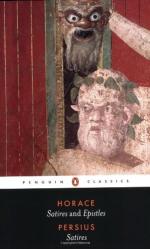|
This section contains 12,694 words (approx. 43 pages at 300 words per page) |

|
SOURCE: Anderson, William S. Introduction to The Satires of Persius, translated by W. S. Merwin, pp. 7-50. Bloomington: Indiana University Press, 1961.
In the following essay, Anderson notes that Persius rejected verbiage that appealed to the senses rather than to the mind, that he never wasted a word, and that his style was harsh, shocking, and effective.
The poet who dies young after a brief life of dedication to his craft has always been a congenial figure to our imaginations, for we naturally tend to conjecture what might have become of him had he survived to the age of a Sophocles or his modern counterpart, Robert Frost. Aules Persius Flaccus died at 28, long before he had completed his work, leaving a small body of poems which constitute some of the most revolutionary writing in an age of ceaseless literary experiment. What might have happened to Roman poetry, especially Roman...
|
This section contains 12,694 words (approx. 43 pages at 300 words per page) |

|


